Related Research Articles
The Bronze Star Medal (BSM) is a United States Armed Forces decoration awarded to members of the United States Armed Forces for either heroic achievement, heroic service, meritorious achievement, or meritorious service in a combat zone.

Donald Henry Rumsfeld was an American politician, government official and businessman who served as Secretary of Defense from 1975 to 1977 under president Gerald Ford, and again from 2001 to 2006 under President George W. Bush. He was both the youngest and the oldest secretary of defense. Additionally, Rumsfeld was a four-term U.S. Congressman from Illinois (1963–1969), director of the Office of Economic Opportunity (1969–1970), counselor to the president (1969–1973), the U.S. Representative to NATO (1973–1974), and the White House Chief of Staff (1974–1975). Between his terms as secretary of defense, he served as the CEO and chairman of several companies.
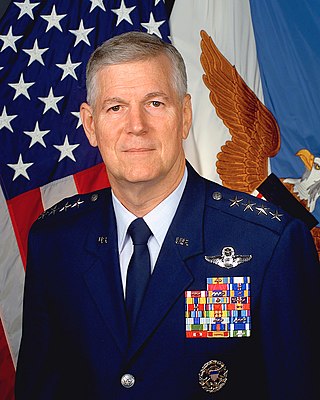
Richard Bowman Myers is a retired United States Air Force general who served as the 15th chairman of the Joint Chiefs of Staff. As chairman, Myers was the highest ranking uniformed officer of the United States military forces. He also served as the 14th president of Kansas State University from 2016 to 2022.
The military history of the United States spans over two centuries, the entire history of the United States. During those centuries, the United States evolved from a newly formed nation which fought for its independence from the Kingdom of Great Britain (1775–1783) to world superpower status in the aftermath of World War II to the present. As of 2021, the United States Armed Forces consists of the Army, Marine Corps, Navy, Air Force and Space Force, all under the command of the Department of Defense, and the Coast Guard, which is controlled by the Department of Homeland Security.
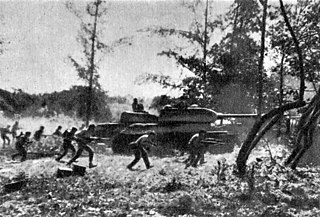
The Bay of Pigs Invasion was a failed military landing operation on the southwestern coast of Cuba in 1961 by Cuban Democratic Revolutionary Front (DRF), consisting of Cuban exiles who opposed Fidel Castro's Cuban Revolution, covertly financed and directed by the U.S. government. The operation took place at the height of the Cold War, and its failure influenced relations between Cuba, the United States, and the Soviet Union.

The Special Activities Center (SAC) is a division of the United States Central Intelligence Agency responsible for covert and paramilitary operations. The unit was named Special Activities Division (SAD) prior to 2015. Within SAC there are two separate groups: SAC/SOG for tactical paramilitary operations and SAC/PAG for covert political action.
This timeline of United States government military operations, based in part on reports by the Congressional Research Service, shows the years and places in which U.S. military units participated in armed conflicts or occupation of foreign territories. Items in bold are wars most often considered to be major conflicts by historians and the general public.

Lloyd James Austin III is an American politician and retired United States Army four-star general who has served as the 28th and current United States secretary of defense since January 22, 2021. Before retiring from the military in 2016, Austin served as the 12th commander of United States Central Command (CENTCOM), beginning in March 2013. Prior to that he served as the 33rd vice chief of staff of the Army from January 2012 to March 2013, and as commander of United States Forces – Iraq from September 2010 to December 2011. He is the first African American to hold each of these positions. After retiring from the armed services Austin joined the boards of Raytheon Technologies, Nucor, Tenet Healthcare, and Auburn University. On December 7, 2020, he was nominated for defense secretary by then-President-elect Joe Biden and was confirmed by the United States Senate on January 22, 2021, by a vote of 93–2.

DoD News Channel was a television channel broadcasting military news and information for the 2.6 million members of the U.S. Armed Forces. It was widely available in the United States as a standalone television channel, or as part of programming on local PEG cable television channels. It could be viewed FTA in most Central and Western European countries, Africa, the Americas and most of Asia via satellite, and globally via the Internet. DoD News Channel was free, in the public domain, and accessible 24/7 to all U.S. cable and satellite providers.
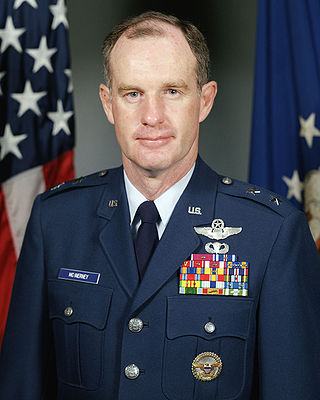
Thomas McInerney is a political commentator and a retired United States Air Force Lieutenant General.

The Intelligence Star is an award given by the Central Intelligence Agency to its officers for "voluntary acts of courage performed under hazardous conditions or for outstanding achievements or services rendered with distinction under conditions of grave risk". The award citation is from the Director of the Central Intelligence Agency and specifically cites actions of "extraordinary heroism". It is the third-highest award given by the Central Intelligence Agency, behind the Distinguished Intelligence Cross and Distinguished Intelligence Medal, and is analogous to the Silver Star, the US military award for extraordinary heroism in combat. Only a few dozen people have received this award, making it one of the rarest valor awards awarded by the US government.
The Iraqi Armed Forces are the military forces of the Republic of Iraq. They consist of the Iraqi Army, the Iraqi Air Force, and the Iraqi Navy. Along with these three primary service branches, there exists the Iraqi Counter Terrorism Service and the Popular Mobilization Forces. The President of Iraq acts as the supreme commander as outlined by the constitution.
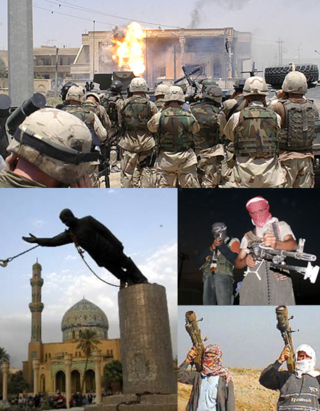
The Iraq War was a protracted armed conflict in Iraq from 2003 to 2011. It began with the invasion of Iraq by the United States-led coalition that overthrew the Ba'athist government of Saddam Hussein. The conflict continued for much of the next decade as an insurgency emerged to oppose the coalition forces and the post-invasion Iraqi government. US troops were officially withdrawn in 2011. The United States became re-involved in 2014 at the head of a new coalition, and the insurgency and many dimensions of the armed conflict are ongoing. The invasion occurred as part of the George W. Bush administration's war on terror following the September 11 attacks.

Rick Francona is an author, commentator and media military analyst. He is a retired United States Air Force intelligence officer with experience in the Middle East, including tours of duty with the National Security Agency, the Defense Intelligence Agency and the Central Intelligence Agency. He was under contract to NBC News and appeared regularly on NBC, MSNBC and CNBC, as well as Radio Canada and other media. In 2013, he became a military analyst with CNN.
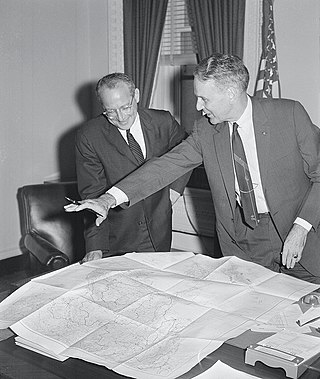
The Taylor-Rostow Report was a report prepared in November 1961 on the situation in Vietnam in relation to Vietcong operations in South Vietnam. The report was written by General Maxwell Taylor, military representative to President John F. Kennedy, and Deputy National Security Advisor W.W. Rostow. Kennedy sent Taylor and Rostow to Vietnam in October 1961 to assess the deterioration of South Vietnam’s military position and the government's morale. The report called for improved training of Army of the Republic of Vietnam (ARVN) troops, an infusion of American personnel into the South Vietnamese government and army, greater use of helicopters in counterinsurgency missions against North Vietnamese communists, consideration of bombing the North, and the commitment of 6,000-8,000 U.S. combat troops to Vietnam, albeit initially in a logistical role. The document was significant in that it seriously escalated the Kennedy Administration's commitment to Vietnam. It was also seen historically as having misdiagnosed the root of the Vietnam conflict as primarily a military rather than a political problem.
The United States government has been involved in numerous interventions in foreign countries throughout its history. The U.S. has engaged in nearly 400 military interventions between 1776 and 2023, with half of these operations occurring since 1950 and over 25% occurring in the post-Cold War period. Common objectives of U.S. foreign interventions have revolved around economic opportunity, social protection, protection of U.S. citizens and diplomats, territorial expansion, fomenting regime change, nation-building, and enforcing international law.

Michael George Vickers is an American defense official who served as the Under Secretary of Defense for Intelligence (USD-I). As USD-I, Vickers, who was appointed by President Barack Obama in 2010, was the Defense Department's top civilian military intelligence official. Before becoming USD-I, Vickers served as Assistant Secretary of Defense for Special Operations and Low Intensity Conflict.

The 1959 to 1963 phase of the Vietnam War started after the North Vietnamese had made a firm decision to commit to a military intervention in the guerrilla war in the South Vietnam, a buildup phase began, between the 1959 North Vietnamese decision and the Gulf of Tonkin Incident, which led to a major US escalation of its involvement. Vietnamese communists saw this as a second phase of their revolution, the US now substituting for the French.

On 22 September 2014, the United States officially intervened in the Syrian civil war with the stated aim of fighting the Islamic State as part of Operation Inherent Resolve in the international war against the Islamic State. The US also supports the Syrian rebels and the Kurdish-led Syrian Democratic Forces opposed to both the Islamic State and Syrian president Bashar al-Assad.
References
- ↑ "Last troops exit Afghanistan, ending America's longest war". Associated Press. August 30, 2021.
- ↑ Rohn, Alan (March 26, 2013). "When was the end of the Vietnam War?". The Vietnam War. Retrieved January 28, 2019.
- ↑ "Defense.gov News Release: NAME OF TECHNICAL SERGEANT RICHARD B. FITZGIBBON TO BE ADDED TO THE VIETNAM VETERANS MEMORIAL". U.S. Department of Defense. November 6, 1998. Archived from the original on July 14, 2015. Retrieved April 19, 2021.
- ↑ U.S. Department of Defense 1998
- ↑ Lawrence 2009 , p. 20
- ↑ "US military deaths in Iraq war at 4,452". San Diego Union-Tribune. May 3, 2011. Retrieved April 19, 2021.
- ↑ "Why can't we stop our wars?". Pittsburgh Post-Gazette. May 18, 2011. Retrieved April 19, 2021.
- ↑ Wood, David (April 27, 2011). "Robert Gates' Pentagon Legacy: Unfinished Wars, Unfinished Budget Reform" – via Huff Post.
- ↑ "Obama May Face Tough Decision as Iraqi Leader Signals U.S. Troops Could Stay".
- ↑ "Pentagon Rethinks Iraq pull-out Plans". Financial Times.
- ↑ Terkel, Amanda (May 11, 2011). "Iraq Withdrawal Date For U.S. Troops May Be Pushed Back Beyond 2011" – via Huff Post.
- ↑ Robert L. Willett, "Russian Sideshow" (Washington, D.C., Brassey's Inc., 2003), page 267
- ↑ "Our Longest U.S. War: Medical Treatments for Gulf War Illness Remain Elusive | Swords to Plowshares". Archived from the original on February 26, 2014. Retrieved July 12, 2013.
- ↑ "A Kosovo Chronology | War In Europe | FRONTLINE | PBS". www.pbs.org. Retrieved April 19, 2021.
- ↑ The Bay of Pigs Invasion, CIA (April 18, 2016).
- ↑ Bill Bowden, Files link Arkansans to role in Bay of Pigs: Kennedy, aides discuss it in 1963 tapes, Arkansas Democrat-Gazette (April 18, 2021).
- ↑ "U.S. Participation in Major Wars". Fox News. Associated Press. November 25, 2006. Retrieved July 11, 2017.
- ↑ "U.S. involved in Iraq war longer than it was in World War II". UT San Diego. November 25, 2006. Archived from the original on October 20, 2012. Retrieved April 19, 2021.